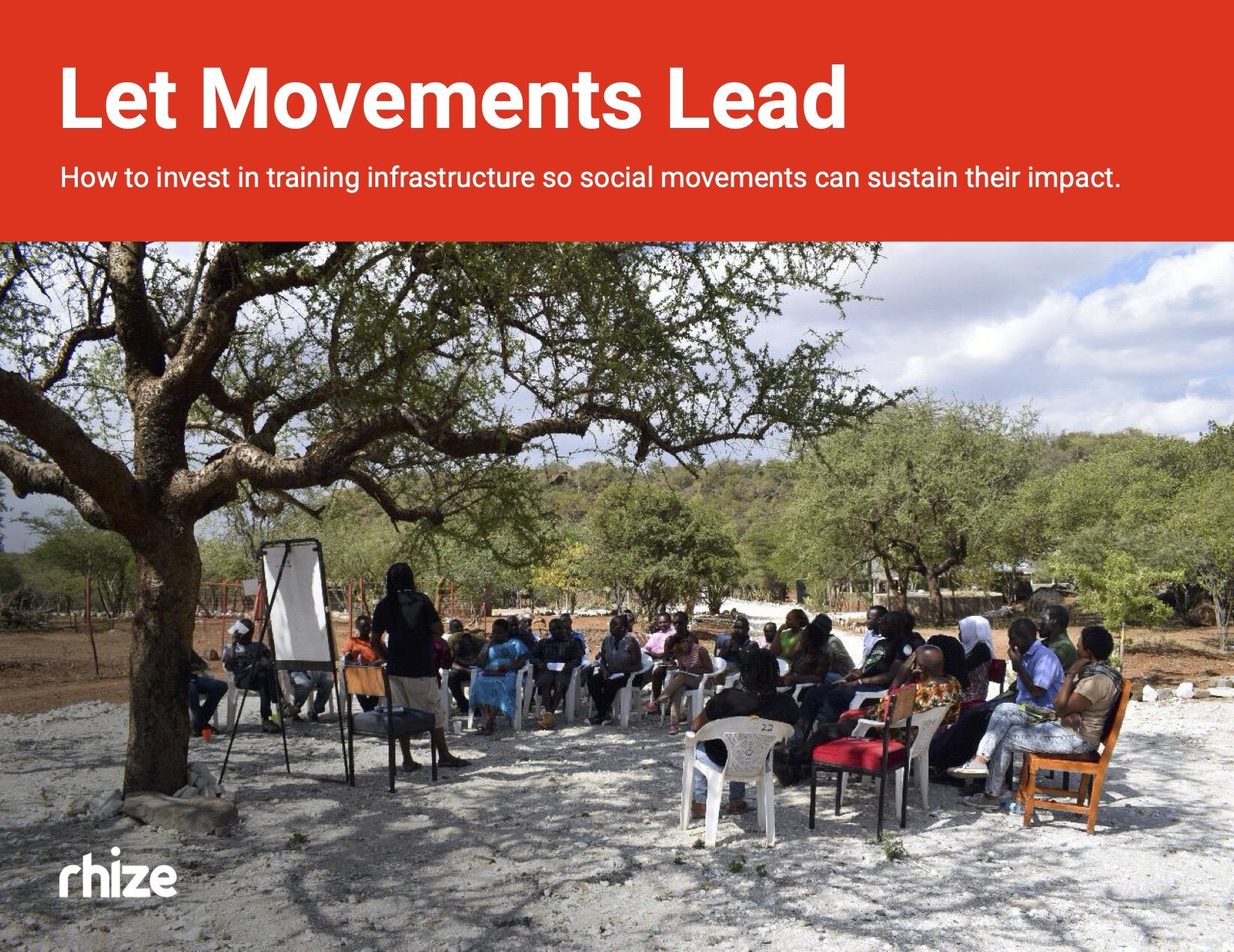Let Movements Lead
In 18 months, Rhize…
How did we do this? Let Movements Lead is an in-depth look at how Rhize built our Coaching Model and how investment in movement organizers can build new power and have long-term impact on communities. Download the report.
ABOUT THE REPORT
Let Movements Lead is the culmination of five years’ of work with movements and traditional institutions to understand the most effective ways to support movements. Traditional institutions increasingly recognize the importance of movements as a major force in strengthening civil society, and this report lays out the most effective method for doing so: the Rhize Coaching Model.
Throughout the report, we detail the Africa launch of what has become Rhize’s Global Coaching Corps (GCC), a coaching network. The launch of the GCC allowed us to apply and systematize the Rhize Coaching Model, which comes from our experience and from data and research pointing to the need for new methods for long-term support of movements. The Rhize team, along with community activists, combined our lessons and conclusions about what is needed to accelerate the impact and potential of grassroots movements globally.
The Rhize Coaching Model is all about investing in experienced movement organizers in their local context and facilitating their ability to more consistently provide trainings and new tools to movements in their communities creates a force-multiplying effect that enables more grassroots-led movement leaders to gain access to proven skills, strategies, and resources they can apply and adapt to build power through collective action around the issues their communities face.
Over the course of 2017-2018, we applied the Rhize Coaching Model to our work with 8 coaches in Africa. This meant:
Hosting retreats where coaches could directly connect with and learn from each other
Supporting coaches by helping them gain additional tools to provide more strategic support to movements
Working with coaches to develop their autonomy for training and resource support beyond Rhize
WHAT DID WE LEARN?
Over the course of the pilot run in Africa, we learned that the coaching model works. By centering our work around movements and their goals and by working with coaches to create a force multiplying effect, we have developed an effective and nimble model that supports peer-to-peer learning and independent growth. Some key lessons we learned are:
By focusing on and training coaches rather than working with individual movements, we created a force-multiplying effect that allowed coaches to work with and empower a number of movements.
Real change takes time. Because movement-building is a long-term proposition, the long-term coaching presence is important. Our hope is that long-term partnership with movements means that coaches can help movements better strategize and predict these events before they happen so that they can be better prepared or, at the very least, so that they have access to resources and other networks that can support them.
Movement mapping is essential. It’s important to understand the local context, and understand the relationship between different movements and actors. Movement mapping also helps us understand what the movements’ goals are for themselves. When we define success according to how each movement define success, we ensure that we’re helping movements meet their actual goals rather than what we think their goals should be.
While Rhize’s curriculum provides a starting point for coaches, it is essential for coaches to work together and learn from each other in order to push the learning curve forward as activists face new challenges. Their ability to learn from each other, mentor each other, and form lasting bonds sparked transnational outcomes and acts of solidarity that we never could have predicted would happen so quickly.
Coaches who have independent operations have more sustainable results. Coaches who were able to set up their own training operations were the most successful. This allows for the coach to have autonomy, outside of Rhize, and makes it easier for them to secure their own funding for their work.
WHAT’S NEXT?
Now that we have developed and honed the Rhize Coaching Model through this initial pilot phase, we’re excited to apply it on a more systematic basis as part of the Rhize Coaching Fellowship. The RCF brings together movement leaders, coaches, trainers, organizers and activists working with movements to learn from each other and gain new skills to support movements.


